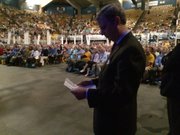Former Republican National Committee Chairman Ed Gillespie addresses delegates at the Roanoke Civic Center. Photo by Michael Lee Pope.
When conservative preacher E.W. Jackson took the stage at the Roanoke Civic Center to introduce Tea Party favorite Shak Hill at the Republican convention last weekend, hundreds of conservatives from across Virginia took to their feet. They waved placards. They applauded. They voiced approval. It was a moment former Alexandria Vice Mayor Bill Cleveland, who served as Jackson's Northern Virginia coordinator, later said was a surprise to him.
"Fantastic," said Cleveland. "I had no idea that was going to happen."
In the end, though, it was not enough for Hill, a former Air Force pilot who is currently an insurance agent in Burke. Even before all of the congressional districts announced their results, it became clear that Ed Gillespie had secured a decisive victory. So Hill took the stage to concede the election and ask the convention to nominate Gillespie by acclamation. Gillespie, a former chairman of the Republican National Committee, has decades of experience working as a consultant and fundraiser in Republican politics. When asked by reporters about his ties to the super PAC known as American Crossroads, Gillespie said he wanted "to be clear" about his history with the group.
"I was never on the board, never an employee, never a consultant," said Gillespie. "My view is I've got to run my campaign, and I've got to raise the resources for me to get the message to the voters of Virginia and get the information to the voters of Virginia on my own."
GILLESPIE ENTERS the race for U.S. Senate at a competitive disadvantage to incumbent U.S. Sen. Mark Warner of Old Town. Back in March, Quinnipiac University issued a poll that had Warner with 46 percent of the vote and Gillespie at 31 percent. The polls had a sample size of 1,300 voters and a margin of error of plus or minus 2.7 percent. Gillespie supporters say he was the only candidate who could raise the kind of money that would be needed to defeat an incumbent Democrat such as Warner, who accumulated a vast personal fortune as an early investor of a telecommunications company known as Nextel that later merged with Sprint. Gillespie has already raised more than $3 million, and he had the best fundraising quarter for any non-incumbent Republican Senate candidate.
"He can raise the money," said Alexandria delegate Sharon Annear, who voted for Gillespie. "That's key in this day and age for any campaign, but particularly when you are running against a millionaire."
Democrats are eager to turn Gillespie's background against him, staging an event outside the convention hall to brand him "Pocket Ed," a reference to his background as a Washington consultant with ties to money and power. Moments after Gillespie secured the nomination, Democrats issued a press release laying out the campaign they hope to wage against him. Warner likes to call himself a "radical moderate," a position that his supporters hope to use to position the incumbent Democrat against his Republican challenger.
"Ed Gillespie calls himself a 'partisan warrior,' and has spent his life whipping up gridlock or lobbying for special interests willing to pay the right price," said Democratic party chairman Dwight Jones. "Virginians want a problem solver not a partisan warrior."
THE CONVENTION highlighted a division within the Republican Party that has become more pronounced in recent years, a split between the chamber of commerce wing and the Tea Party set. That's a division that will be at the center of a struggle for dominance of the party in 2016, when control of the chairmanship and executive committee will be at stake. Potential candidates and their supporter were already working the convention floor in an effort to secure support last weekend, an indication that direction of the party may be at stake as the internal struggle intensifies.
"It's going to be a bloodbath," said convention parliamentarian Chris Marston, chairman of the Alexandria Republican City Committee.
The central point of discussion between the factions is expected to be the wisdom of having conventions to select candidates. While Democrats always use primaries, Republicans have used primaries only eight times in the last 100 years to select statewide candidates. Last year's convention in Richmond ended in a surprise victory for Jackson, who secured the nomination to run for lieutenant governor after more than 12 hours of intense politics. Democrats pounced on Jackson's record of comparing Planned Parenthood to the Ku Klux Klan and calling gays "sexually twisted" to brand the party as intolerant, and all three statewide candidates went down to defeat.
"As we saw last year in Richmond, sometimes things get out of hand," said Chris Brown, a Republican delegate from Herndon. "I think the more rank-and-file people would probably prefer a primary. It certainly less commitment on their part, allows them to spend more time with their families and allows them to get more of their neighbors energized and allow them to participate."
THE DEBATE about whether to select candidates using a convention rather than a primary may have been the most divisive issue at the convention this year, perhaps even more divisive than the selection of a candidate to run against Warner. Every delegate seemed to have an opinion about the issue, and opinions were all over the map. Some looked at the recent history as an indication that the party needed to change direction. Others said conventions offered a way for candidates to save fundraising dollars for a general election rather than spending the campaign war chest going after other Republicans.
"It's not always Republicans that are voting for a candidate," said James Glenn, a delegate from Mount Vernon. "In addition to independents you could have Democrats crossing over. So you're not truly getting a Republican conservative candidate."
For some, the issue of convention versus primary came down to one simple question: Which strategy would defeat Democrats?
"Maybe it will drum up a little support and get people interested in what's happening because we've got too many people who are uninformed and not interested in the political process," said George Graham, a delegate from Arlington. "If we are going to run an American country, we need people who are informed and interested."
REPUBLICANS BELIEVE Warner is a flawed candidate, and they are hoping to seize on his support of the Affordable Care Act during the coming campaign. Over and over, delegates to the convention accused voters of voting for President Barack Obama 97 percent of the time. That's a record that was not pleasing to Republicans, many of whom purchased toilet paper featuring the image of the Democratic president at a booth off the convention floor. Each roll of toilet paper, made in China, sold for $7.
"It's funny, and it's a great gag," said businessman Stephen Tyler, who was selling the product. "It's a great way to be able to surprise somebody who might be of the other party who you might want to poke some fun at concerning the mockery that's become this administration."
On the convention floor, though, delegates were taking a much more serious approach to the campaign. In the coming months, they hope to portray Warner as a big-spending liberal who supports expanding health insurance for those who live in poverty or are disabled.
"He has voted for big tax increases. He has voted for big spending," said Jay McConville, former chairman of the Fairfax County Republican Committee. "He is an Obamacare supporter, and that is not what the people of Virginia need and that's why we are going to replace him with Ed Gillespie."





